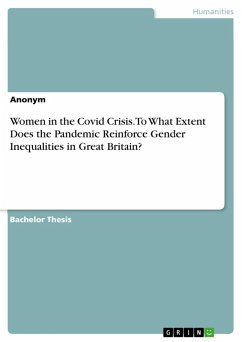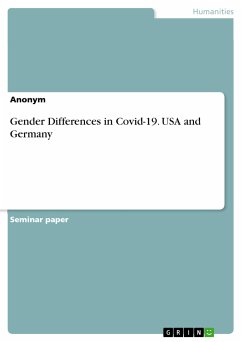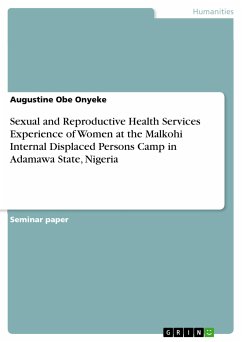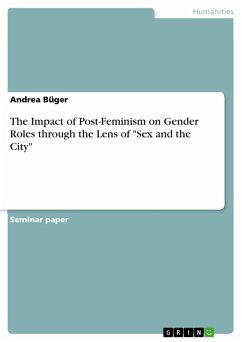
Women in the Covid Crisis. To What Extent Does the Pandemic Reinforce Gender Inequalities in Great Britain? (eBook, PDF)
Sofort per Download lieferbar
Statt: 18,95 €**
15,99 €
inkl. MwSt. und vom Verlag festgesetzt.
**Preis der gedruckten Ausgabe (Broschiertes Buch)
Alle Infos zum eBook verschenkenWeitere Ausgaben:

PAYBACK Punkte
0 °P sammeln!
Bachelor Thesis from the year 2022 in the subject Gender Studies, grade: 2,7, Free University of Berlin (Institut für Englische Philologie), course: Culture-Gender-Media, language: English, abstract: The aim of this thesis is to examine the impact of the coronavirus pandemic on women in the UK. As a theoretical basis, I will first illustrate gender inequalities that already existed before the pandemic and divide them into the private and public sphere. Afterwards, the impact of the coronavirus crisis on women will be analysed by looking more closely at the effect on women in the workforce and...
Bachelor Thesis from the year 2022 in the subject Gender Studies, grade: 2,7, Free University of Berlin (Institut für Englische Philologie), course: Culture-Gender-Media, language: English, abstract: The aim of this thesis is to examine the impact of the coronavirus pandemic on women in the UK. As a theoretical basis, I will first illustrate gender inequalities that already existed before the pandemic and divide them into the private and public sphere. Afterwards, the impact of the coronavirus crisis on women will be analysed by looking more closely at the effect on women in the workforce and the physical and mental implications. Next, I will introduce a survey that I conducted regarding women's representation in media coverage in the UK to present different perceptions regarding this matter. The paper continues by examining the distribution of men and women as experts on the pandemic. Finally, five coronavirus-related articles from the online tabloid DailyMail will be analysed to explore whether men are actually more likely to be used for objective statements and women for subjective opinions during the pandemic. My conclusion will summarise the above points and answer the question of this thesis: To what extent does the pandemic reinforce gender inequalities in Great Britain? Just as any other country around the world, Great Britain was hit hard by the coronavirus crisis and is now suffering its consequences. At the present time, Great Britain has recorded around 166,000 deaths. The UK has implemented many measures to counteract the pandemic: in addition to the compulsory wearing of masks, this also involves the general shutdown of public life, the switch to online teaching, and the temporary closure of kindergartens. Besides the economic shock the country is suffering from, social disparities have become more visible. There are many structural problems that the pandemic has clearly brought to light: Overwork and underpayment in the health sector, digitalisation that is progressing too slowly, and too little recognition of workers in social professions - these are just some examples. However, if you look at statistics, you quickly notice that in a lot of areas it is especially women, who have to suffer from the pandemic. According to the Office for National Statistics (ONS) of Great Britain "[w]omen were more likely to be furloughed, and to spend significantly less time working from home, and more time on unpaid household work and childcare".
Dieser Download kann aus rechtlichen Gründen nur mit Rechnungsadresse in A, B, BG, CY, CZ, D, DK, EW, E, FIN, F, GR, HR, H, IRL, I, LT, L, LR, M, NL, PL, P, R, S, SLO, SK ausgeliefert werden.













